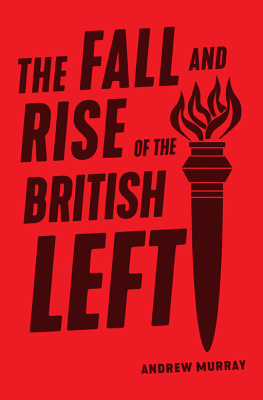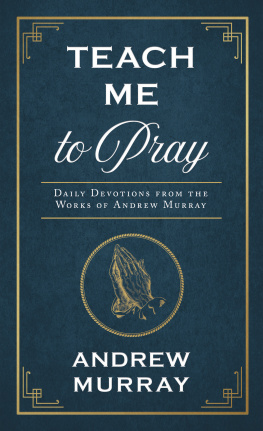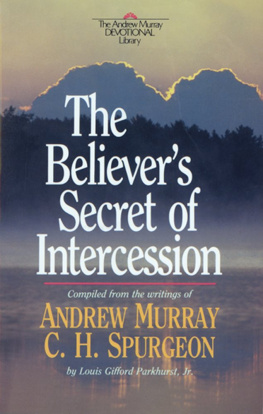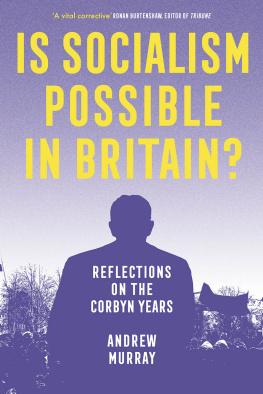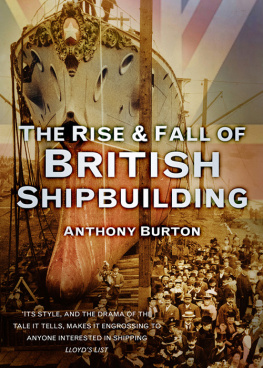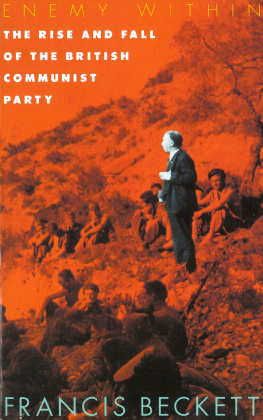Andrew Murray - The Fall and Rise of the British Left
Here you can read online Andrew Murray - The Fall and Rise of the British Left full text of the book (entire story) in english for free. Download pdf and epub, get meaning, cover and reviews about this ebook. year: 2019, publisher: Verso, genre: Politics. Description of the work, (preface) as well as reviews are available. Best literature library LitArk.com created for fans of good reading and offers a wide selection of genres:
Romance novel
Science fiction
Adventure
Detective
Science
History
Home and family
Prose
Art
Politics
Computer
Non-fiction
Religion
Business
Children
Humor
Choose a favorite category and find really read worthwhile books. Enjoy immersion in the world of imagination, feel the emotions of the characters or learn something new for yourself, make an fascinating discovery.
- Book:The Fall and Rise of the British Left
- Author:
- Publisher:Verso
- Genre:
- Year:2019
- Rating:4 / 5
- Favourites:Add to favourites
- Your mark:
- 80
- 1
- 2
- 3
- 4
- 5
The Fall and Rise of the British Left: summary, description and annotation
We offer to read an annotation, description, summary or preface (depends on what the author of the book "The Fall and Rise of the British Left" wrote himself). If you haven't found the necessary information about the book — write in the comments, we will try to find it.
The Fall and Rise of the British Left — read online for free the complete book (whole text) full work
Below is the text of the book, divided by pages. System saving the place of the last page read, allows you to conveniently read the book "The Fall and Rise of the British Left" online for free, without having to search again every time where you left off. Put a bookmark, and you can go to the page where you finished reading at any time.
Font size:
Interval:
Bookmark:

of the British Left
Andrew Murray is chief of staff of the union Unite. He was chair of the Stop the War Coalition from 2001 to 11 and 2015 to 16. He is the author of a number of books on history and politics, including Off the Rails and Stop the War: The Story of Britains Biggest Mass Movement (with Lindsey German). He worked as part of the strategic leadership of Labours 2017 general election campaign and continues to advise the party.
of the British Left

First published by Verso 2019
Andrew Murray 2019
All rights reserved
The moral rights of the author have been asserted
1 3 5 7 9 10 8 6 4 2
Verso
UK: 6 Meard Street, London W1F 0EG
US: 20 Jay Street, Suite 1010, Brooklyn, NY 11201
versobooks.com
Verso is the imprint of New Left Books
ISBN-13: 978-1-78873-513-1
ISBN-13: 978-1-78873-515-5 (US EBK)
ISBN-13: 978-1-78873-514-8 (UK EBK)
British Library Cataloguing in Publication Data
A catalogue record for this book is available from the British Library
Library of Congress Cataloging-in-Publication Data
A catalog record for this book is available from the Library of Congress
Typeset in Fournier by MJ & N Gavan, Truro, Cornwall
Printed in the US by Maple Press
For Jane Barker and Eddie Barrett
M any people have assisted in the writing and preparation of this book. At Verso, particular thanks to my superb editor Leo Hollis, whose suggestions have enhanced the finished work considerably; to Tariq Ali for his support and political commitment; and to Tim Clark, Mark Martin and Rosie Warren for their assistance.
A number of comrades and friends have been kind enough to read all or part of this in draft, and to have stimulated numerous vital improvements Shelly Asquith, Sian Errington, Lindsey German, Len McCluskey, Jessica Murray, Laura Murray, Carmel Nolan, John Rees, Jane Shallice, Jennie Walsh and Nick Wright. Particular thanks to Jessica Murray for her invaluable research assistance on a number of points.
None of the aforementioned bear any responsibility for either errors included or opinions expressed in the text. Given that I work as Chief of Staff at Unite the Union and as an adviser to the Leader of the Labour Party it is important to emphasize that I write exclusively on my own behalf. In particular, for the benefit of the odd journalist who may stray upon this work, the views expressed here are not necessarily Jeremy Corbyns!
Special thanks to my wife Anna; children Jessica, Jack and Laura Murray and Sally Charlton for their support; and my grandchildren Vincent, Shannon and Zoe for the lovely distractions. I hope that by the time the last three make sense of stuff in the wider world, this stuff makes sense to them.
The period covered in these pages more or less corresponds to my own active political life to date. The argument therefore bears the imprint of many comrades who I have learned from and worked with down the decades mostly in the Communist Party, the Stop the War Coalition, the Labour Party and Unite the Union (previously, for me, the Transport and General Workers Union). They are too numerous to reference individually, but it would be remiss not to record special thanks to the leadership of my union, in particular its General Secretary Len McCluskey and the Chair of the Executive Council, Tony Woodhouse.
This book is dedicated to Eddie Barrett and Jane Barker, two comrades and friends from the T&G who couldnt stick around to see the possible imminence of a socialist government in our country but who certainly fetched their stones to that cairn. Those who knew them can easily imagine their enthusiasm at this conjuncture, and it is further motivation to press on.
Andrew Murray
London, March 2019
And yet it moves.
Galileo Galilei
A s the Labour leadership campaign of summer 2015 unfolded, it became clear at some point that Jeremy Corbyn might win. Amid the mounting enthusiasm generated by this prospect a fantastical one just a few weeks earlier I went to a campaign rally held at the Camden Town Hall in London. The room was engulfed in a noisy energy and optimism. Pumped up by Owen Jones, the many hundreds attending were at a pitch of political excitement even before the main event took to the stage. It felt and sounded like an outpouring of feelings largely suppressed for a generation or more.
In my lifetime, I reflected, this sort of movement ends one of two ways for the left whenever a leader in whom such hopes are invested secures office. After a bold start, the new government either swiftly finds it expedient to compromise with the institutions of economic and political power, thereby disappointing the people and dividing supporters before slinking back into opposition; or it holds fast to its commitments, defies the establishment, tackles the centres of privilege and we all get shot.
So, time for a third way. This book aims to contribute to the search.
Somewhat unexpectedly, Britain seems ahead of all comparable democracies in presenting the opportunity for an alternative to both neoliberal centrism and the national-populist authoritarianism which has arisen in rejection of the former. The progressive left has returned from the political grave to have a passable shot at governing before long, although the way ahead is obstacle-strewn.
On the day this is written the Daily Telegraph carries an article bemoaning the fact that Corbynism has broken out of its British fastness to infect the politics of, inter alia, the Democratic Party in the USA and the left in France and Germany: When the far Left took control of the Labour Party, it was possible to dismiss its cranky mix of Seventies state control and punitive taxes as a purely British phenomenon with no real lasting appeal. Now it turns out that it was merely the beginning of a worldwide trend.
Who would have thought? Not the professional commentariat in the Westminster bubble for sure, who can, at the very gentlest, be criticized for a chronic lack of curiosity and imagination. They are prisoners not merely of their own prejudices but of a linear misreading of history that holds that the way things are is the way they have to be and the way they must surely remain.
This book endeavours to set the revival of the left in context. Central to this is the international development of neoliberalism, which emerged as a political force (after prolonged intellectual incubation) at around the same time as the labour movement in Britain was at the pinnacle of its influence. As neoliberalism advanced from think-tanks in Chicago to actual tanks in Santiago, so the left retreated from the centre to the margins.
Since then neoliberalism has become something of a catch-all term of abuse. It is not, however, the same thing as either capitalism or right-wing authoritarianism, although it is related to both. It was the guiding thinking behind the ruling-class initiatives that swept away the power of the labour movement the social base of the political left over the course of the 1980s. Its main precepts, centred on maximizing the scope of market relationships at the expense of almost everything else, were hegemonic worldwide until the financial crash of 2008. The fall and rise of the left in Britain, then, mirrors the rise and fall of neoliberalism around the world.
Font size:
Interval:
Bookmark:
Similar books «The Fall and Rise of the British Left»
Look at similar books to The Fall and Rise of the British Left. We have selected literature similar in name and meaning in the hope of providing readers with more options to find new, interesting, not yet read works.
Discussion, reviews of the book The Fall and Rise of the British Left and just readers' own opinions. Leave your comments, write what you think about the work, its meaning or the main characters. Specify what exactly you liked and what you didn't like, and why you think so.

